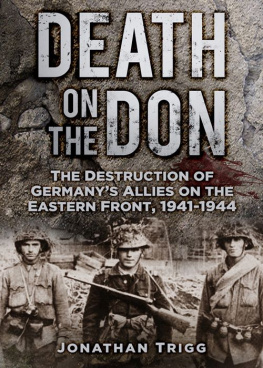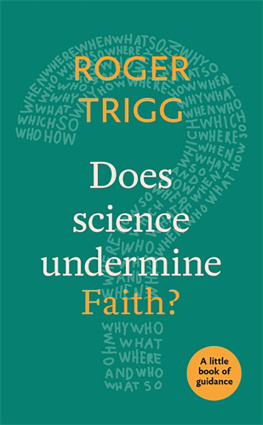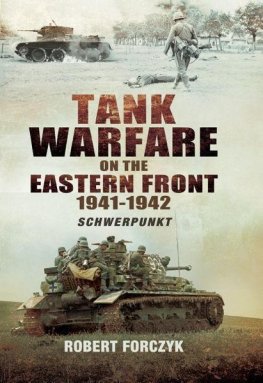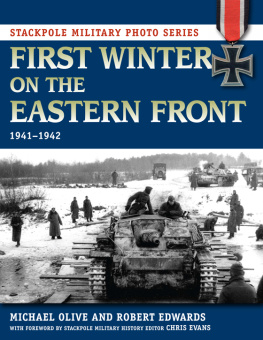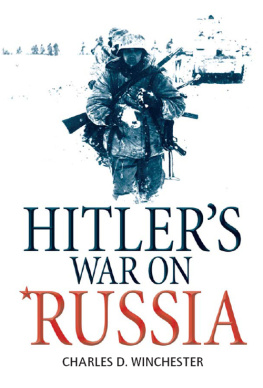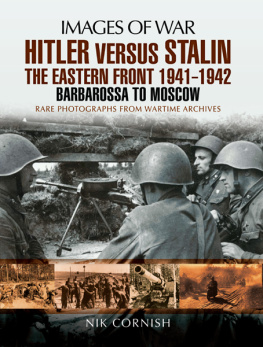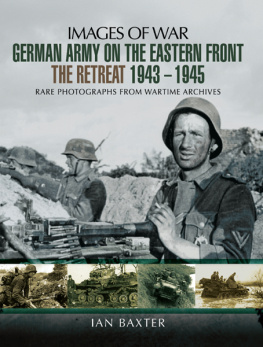C ONTENTS
Romanian Army Order of Battle, Eastern Front, November 1942
Romanian Infantry Divisions and Recruiting Areas
German Casualties Eastern Front
After studying history at university and then going on to a career in the British Army in a first-rate infantry regiment, it is perhaps surprising that I came to actually writing military history later than people might imagine. Examining the reasons for this seeming mystery, I am quite sure that it was my experience in the army that effectively mothballed any nascent desire to become a serious student of war. At the Royal Military Academy Sandhurst (RMAS), in the (now defunct) compressed seven-month Standard Graduate Course for young officers, the few lessons in military history with extremely well-read civilian tutors were gratefully accepted opportunities for cadets, like myself, to snatch a few minutes of extra sleep to make up for the hours lost each and every night polishing boots and ironing every piece of clothing we possessed.
Arrival at my battalion, then, was like escaping purgatory, but as regards the study of war, it was no better. Infantry work is hard, physically demanding and all about detail, and an officers mess tends to reflect this. My own was, I am sure, pretty similar to most others, being filled with the dedicated professionals who characterise the British Army and make it, rightly, envied and admired across the world. Physical fitness, integrity, knowledge of the job, commitment to your men and the regiment and playing hard were what we all strived for, and in that atmosphere a more cerebral reflection on conflict, its past and potential future, was anathema. At only one point did a relatively new commanding officer insist that his junior officers, including myself, write an essay on a military topic selected by him. I swear you could have heard the collective groans miles away the project was not a success. My own treatise on the other European Union nations moving to a position of paying the British Army in terms of providing logistics, supplies, intelligence, etc., as a form of foreign legion to intervene in conflicts where they had no wish to place their own nationals in danger did not play well.
Then, by some miracle, I was selected to attend the Junior Division of the British Armys prestigious Staff College (JDSC) as the third youngest student on my course. This was a real opportunity for young officers like myself to reassess mankinds addiction to war and where studying our trade suddenly became more than lip service. For the first time since I had joined the army six years earlier, I now became involved in earnest conversations with other officers discussing the endless tours of duty in our undeclared war in Northern Ireland and the lessons we could learn from Falls Road and Crossmaglen, East Tyrone, the Short Strand, Divis Flats and the Bogside. Added to this were grave dissatisfaction and shame at the impotence of United Nations (UN) forces in Croatia and Bosnia it was while I was at JDSC that I met some fellow officers who had been left powerless and unsupported in the face of horrendous brutality by all sides involved in those vicious civil wars, the get-out clause for both officialdom and senior command being we have no UN mandate to intervene. It is to the eternal credit of my own Commanding Officer at the time of our tour in Croatia and Bosnia (even now I will not name him, just in case) that he gave every single one of us crystal-clear instructions that, UN mandate or not, we should be governed by our consciences and a solid sense of right and wrong. If we thought innocent lives were in danger, we were to act as those same consciences dictated. Our colonel was a good man and a great officer.
However, events on these operations resulted in a distinct sense of discomfort among some senior officers that they now possessed a generation of young commanders who were beginning to look beyond the Cold War and its certainties and wanted to begin to prepare for an altogether different era. I will never forget one senior officer in paticular who came to see us at JDSC. After what had clearly been a good lunch, he proceeded to lecture an audience of young captains with the usual balderdash senior officers come out with when they had not bothered to think very much about what they were going to say beforehand. Well, it was a hot summers day; we had all been working extremely hard, and tempers were somewhat short. At one point, I seriously thought he was going to start screaming in rage as officer after officer demanded answers to pertinent questions a solution to Ulster, the primacy of politics over the military and the future of BAOR (The British Army on the Rhine the UKs military commitment to NATO in mainland Europe and for decades the largest concentration of British forces). This was followed by questions on the nightmarish operational-tour system. In the end, he insisted that it was not the place of young officers to ask questions or try to understand issues above their pay grade.
It was at that point that I realised that if I was to become a student of history, and the wars that dominate so much of that same history, then it was unlikely to be within the ranks of the British Army. Having said that, one of the few positives to come out the recent, and still unfinished, wars in Iraq and Afghanistan is a real awakening among whole classes of young officers of the importance of military history to their own current situations and its relevance to finding a way to win with honour long may that resurgence continue.
As for me, this is now the sixth military history book I have written and the fifth on the Second World War. Subject-wise, this volume is a significant departure personally, having focused, up until now, almost exclusively on the exploits and battles of Nazi Germanys second army, the Waffen-SS, especially the large numbers of non-German nationals who, for a variety of reasons, ended up fighting in its ranks. Having written about the French, Belgian Flemish, Muslim and Scandinavian volunteers, I feel I have covered large tranches of that particular subject perhaps the largest one left to me would be a volume on the hundreds of thousands of ethnic Germans from Eastern Europe who served in the ranks of the Waffen-SS.
As it is, my work has mainly focused on the fighting in the Soviet Union as that is where, to a large degree, the Waffen-SS fought their war. Writing on that mammoth campaign I have not touched on the Soviet victory at Stalingrad and the Don River offensives in anything more than a cursory manner the SS were not involved and it always seemed to me that this monumental battle had been covered and covered again by historians of the utmost skill, among whom Antony Beevor, for me, stands at the pinnacle. As ever, though, with history, certain stories draw you in remorselessly, and for me one such subject was the fate of Germanys allies among them the Romanians, Hungarians, Italians, Croats and Slovaks.
Before beginning this journey, I confess I knew little of them, and what I did know was the usual generalisations that is, they were bit players in a Russo-German war, what forces they did have were throwbacks to a bygone age (all pitchforks and peasants) and when faced with real soldiers firing guns, they invariably took to their heels in an instant. This, according to the legend, was what happened at Stalingrad, and it sealed the fate of the German Sixth Army trapped in the city. The utter dreadfulness of the Axis allies was compounded by Hitlers megalomania, as he continually refused to listen to the reasoning of his professional military advisers.
Then, following Paulus surrender, these allied forces disappeared from view, only to briefly reappear as the victorious Red Army rolled over their borders and imposed Soviet Communism on almost all of them. Needless to say, as I researched more, these myths began to fray and crack, and most ended up being shattered. That is not to say that there arent elements of truth in most of the suppositions that surround the war they fought that, after all, is how legends usually start but it is also clear that time and clich have done their work of obfuscation well. I hope that this book, perhaps, goes a little way to shining a light on the tragedy of hundreds of thousands of men, most flung into a war they neither understood nor really wanted, in which so many of them found nothing but a cold, dark grave in the rich, black earth of the Soviet Union.

